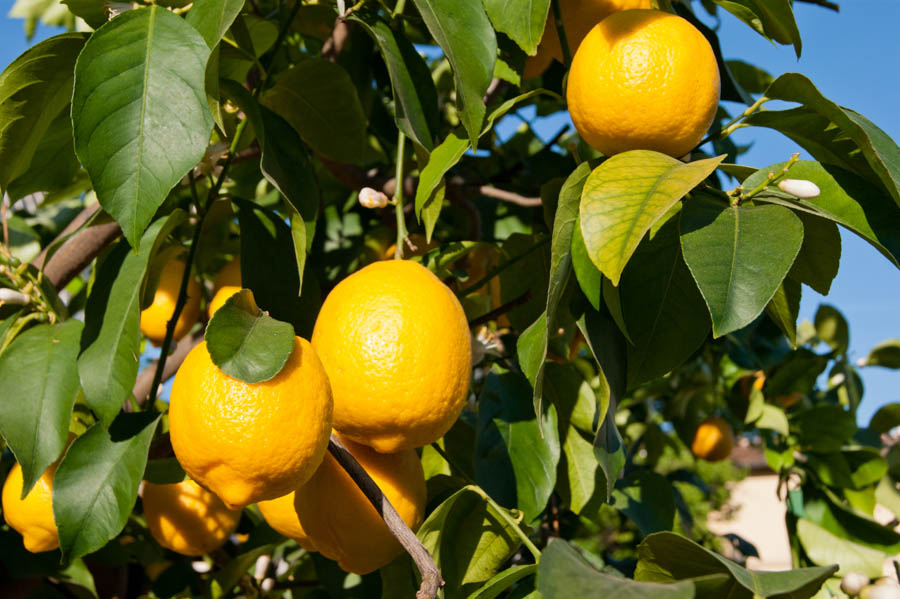Lemon Trees: Flavor, Appearance and Cultural Requirements

Much of coastal and inland California is ideal for growing lemon trees. Gardeners choosing lemon trees should be aware that some are more sensitive to cold than others and that lemons in general are more sensitive to cold temperatures than most other types of citrus. Unlike their sweet citrus counterparts which generally require heat to develop high sugar content, lemon trees are often able to produce good-quality fruit in cooler climates. Lemons commonly grown in the home garden include Eureka, Lisbon, and Improved Meyer (actually a cross between and lemon and orange). GardenZeus recommends growing one Eureka or Lisbon lemon tree for traditional acidic lemon flavor and, if space permits, adding an Improved Meyer Lemon tree for the softer lemon flavor valued in baking. True lemon lovers with large spaces can add Variegated Pink for something fun and different.
Lemons (Citrus limon) are small trees in the Citrus genus and the family Rutaceae, the rue family, with many of its numerous plant members known for producing strongly aromatic, flavorful, leaves and fruit. Trees have beautiful flowers with a purplish-red hue at the base.
Both Eureka and Lisbon lemon trees bear small to medium sized, slightly oblong yellow fruits with similar acid content and thick pulp. Both are commonly found in grocery stores. More than other citrus trees, the size of Eureka and Lisbon trees is controlled more by pruning than by root-stock, and both trees can can easily exceed a desired size if not maintained.
However, Eureka and Lisbon lemon trees have slightly different harvest times, and vary in their growth habit, size, and temperature sensitivity. Compared to Lisbon lemon fruits, Eureka lemons have a more open growth pattern, less vigor (up to 20 feet) and fewer thorns. In some of Northern California’s coastal valleys areas, Eureka lemons bear year round. In most other areas, Eureka lemon trees bear late winter to summer. Eureka lemons trees are the most frost sensitive lemon trees.
Lisbon lemon trees are more vigorous growers (up to 30 feet) and more thorny than Eureka lemon trees. Additionally, Lisbon lemon trees are more tolerant of both high and low temperatures than Eureka lemon trees, making them better choices for growing in the hotter and more frost prone inland valleys of California. Lisbon lemon trees can be highly productive, but must be well-pruned on an annual basis to control their size and shape. Lisbon trees bear year-round in many of Northern California’s coastal valleys, and bear from winter to summer in most other areas of citrus-friendly California.
Improved Meyer lemons (Citrus meyeri) have recently seen a resurgence in popularity among chefs, foodies, and home gardeners. Imported to the United States in 1908 by an agriculturalist Frank Meyer, Meyer lemons are actually a cross between an orange and a lemon (though they are refereed to as lemons). The reason for the Meyer lemons’s popularity lies in its mild, less acidic lemon flavor. The lemons make ideal flavorings for pies, cakes, tarts, cookies and lemonade. When ripe, the fruit is deep yellow, almost orange. However, the fruit is much more delicate than other lemon varieties and its thin skin is more easily damaged when picking, storing, or shipping; for this reason the fruit is generally not commercially viable in our industrialized food system. The Meyer lemon is a favorite of home gardeners, but is not typically found in grocery stores. The trees are semi-dwarf or dwarf and grow to 6-8 feet or 3-4 feet, respectively. Improved Meyer lemons are more resistant to cold than regular lemons, and may be a superior choice if your garden is on the bottom of a slope, or tends to collect cold air. The trees make excellent container plants. Improved Meyer lemons are often harvested year-round in many areas of Northern and Southern California, with a more limited winter to spring harvest period in inland Southern California valleys and other hot inland areas.
Variegated Pink or “Pink Lemonade” lemons are sports of Eureka lemons, with variegated green and white leaves, yellow fruit with green stripes and pink interior flesh. As a sport of Eureka, Variegated Pink lemons are harvested in the same months as yellow Eureka lemons. And like Eureka lemons, Variegated Pink lemon trees are frost sensitive. Gardeners in areas where frost is common should consider growing Variegated Pink in a container and bringing the container indoors or under a roof for winter protection.
Other articles of interest:
GardenZeus Quick Tips: Harvesting Lemons
Getting Started With Citrus: Purchasing and Placing Your Citrus Trees
